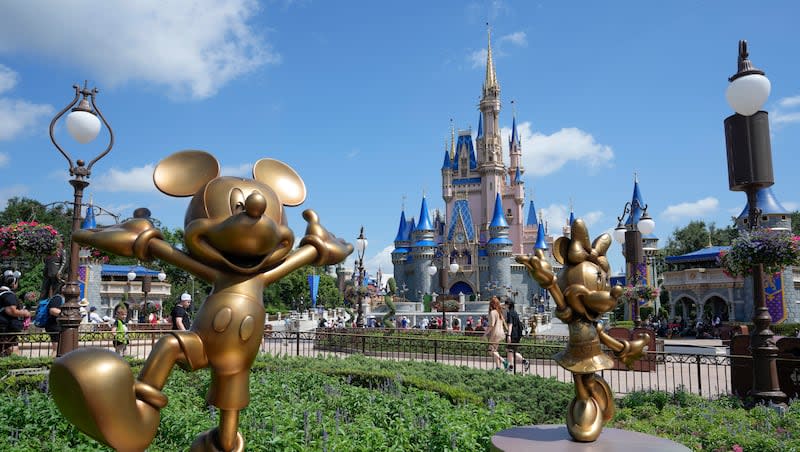DeSantis v. Disney battle is settled

After two years of litigation, the Walt Disney Company and Florida Gov. Ron DeSantis are letting go of their differences.
Disney reached a settlement with the DeSantis-installed Central Florida Tourism Oversight District, surrendering the self-governing status it’s enjoyed for five decades.
But both parties signaled they were ready to put this chapter behind them and continue working together.
This legal back-and-forth began when Disney publicly criticized the Parental Rights in Education Act, dubbed the “Don’t Say Gay” bill by critics, passed in Florida in March 2022. The legislation prohibited instruction on sexual orientation and gender identity in classrooms before fourth grade.
A year later, DeSantis signed a bill ending Disney’s self-governing status, dissolving the Reedy Creek Improvement District, and renaming it the Central Florida Tourism Oversight District.
But before DeSantis’ bill could take effect, the Disney-elected board members negotiated a contract with Disney that left DeSantis’ new board effectively powerless beyond maintaining roads and basic infrastructure.
Disney also filed a federal suit against DeSantis for retaliating against the company for criticizing a controversial parental rights education law, as the Deseret News reported. This suit was dismissed earlier in January 2024.
This settlement agreement, discussed by the oversight board Wednesday, would make the Disney board’s maneuver tactics to hold control over the district “null and void.” Disney and the DeSantis administration also agreed to drop all other related claims and counterclaims in the lawsuit.
Upon settling in court, Jeff Vahle, the president of Walt Disney World, in a statement indicated the beginning of “a new chapter,” and promised Disney’s sustained interest in investing in Florida.
“We are pleased to put an end to all litigation pending in state court in Florida between Disney and the Central Florida Tourism Oversight District,” said Vahle. “This agreement opens a new chapter of constructive engagement with the new leadership of the district and serves the interests of all parties by enabling significant continued investment and the creation of thousands of direct and indirect jobs and economic opportunity in the State.”
DeSantis, during a Wednesday press conference in Orlando, said, “Every action that we’ve taken has been upheld in full.”
“I’m glad that they were able to do that settlement. Those 11th hour covenants and restrictions were never going to be valid. We knew that,” he said.
DeSantis said Disney has plenty to gain in aligning with Florida’s interests, before touting increased competition in the area with Universal Studio’s latest “game changer” project, Epic Universe, slated to open by summer 2025. This project will join other NBCUniversal offerings, including Universal Studios, Islands of Adventure and Volcano Bay.
Disney has four properties in Florida — Magic Kingdom, Epcot, Hollywood Studios and Animal Kingdom — and has a smaller footprint in California with two properties.
“I’ve got to think Disney would have an interest in maybe offering another one,” DeSantis said. “The district will be ready to negotiate something.”
Disney’s 2022 Economic Impact report states the company’s resorts generated $40 billion for Florida’s economy, and a quarter of a million jobs.
The Florida governor said Disney’s pushback in Florida stemmed from Burbank, California, where the company is headquartered. “It was not driven by Orlando and I think we’ve always understood that,” he added.
Disney’s decision to settle is a change in direction from their position in January, when the company said, “This is an important case with serious implications for the rule of law, and it will not end here.”
“If left unchallenged, this would set a dangerous precedent and give license to states to weaponize their official powers to punish the expression of political viewpoints they disagree with. We are determined to press forward with our case.”
This agreement came after the board installed Stephanie Kopelousos, who Politico reported was viewed as favorable to Disney
When a DeSantis bill cracked down on Big Tech censoring right-wing perspectives on social media, Kopelousos wrote a carveout in the legislation that exempted theme park companies, such as Disney and its streaming service Disney+, as Jason Garcia, a corporate accountability reporter, wrote. Her hiring appears to be an olive branch, leaving the door open for collaboration.
